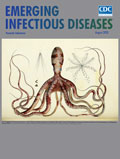
Volume 26, Number 8—August 2020
Dispatch
Plasma-Derived Extracellular Vesicles as Potential Biomarkers in Heart Transplant Patient with Chronic Chagas Disease
Nuria Cortes-Serra, Maria Tays Mendes, Clara Mazagatos1, Joan Segui-Barber, Cameron C. Ellis, Cristina Ballart, Ana Garcia-Alvarez, Montserrat Gállego, Joaquim Gascon, Igor C. Almeida, María Jesús Pinazo , and Carmen Fernandez-Becerra
, and Carmen Fernandez-Becerra
Abstract
Chagas disease is emerging in countries to which it is not endemic. Biomarkers for earlier therapeutic response assessment in patients with chronic Chagas disease are needed. We profiled plasma-derived extracellular vesicles from a heart transplant patient with chronic Chagas disease and showed the potential of this approach for discovering such biomarkers.
Chagas disease, caused by Trypanosoma cruzi parasite, is one of the most prevalent parasitic infections in Latin America and is responsible for millions of clinical cases. However, mainly because of migratory movements, the epidemiology of Chagas disease has changed in recent decades; cases have increased substantially in North America, Europe, and Asia, where it is not endemic (1). Thus, raising awareness of this debilitating or deadly neglected tropical disease and promoting the creation of global strategies for its accurate diagnosis, treatment, and control are of paramount importance.
Detection of T. cruzi–specific antibodies in serologic assays is the current standard technique for diagnosing chronic Chagas disease. However, this so-called conventional serology is not a valid indicator of chemotherapeutic outcomes because most patients remain seropositive for 10–20 years after treatment (2). Therefore, validated biomarkers are lacking for early assessment of therapeutic responses for testing current and new drugs or treatment regimens.
Extracellular vesicles (EVs) are cell-derived membranous nanoparticles present in most biologic fluids. Biofluid-derived EVs are minimally invasive molecular tools for diagnosing and screening diseases (3). They can be released by various mammalian cells and pathogens, and their use as predictive biomarkers for disease progression and treatment outcomes has been reported for different pathologic conditions, including parasitic diseases (3,4).





















.png)












No hay comentarios:
Publicar un comentario